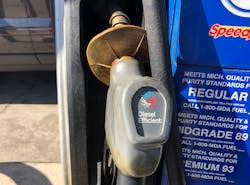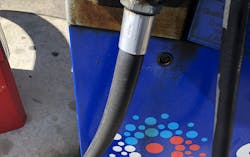We hear a lot about clean diesel. The fuel has come a long way toward burning cleaner through an engine. But these photos taken at my local Mobil station tell a different story. Look closely and you’ll see the residue from diesel. Ground drip from fugitive diesel fuel and discoloration around the nozzle show this fuel’s true nature.
This stop at a gas station reminded me of the advantages of propane autogas at the pump. Propane fueling is a closed-loop system, meaning there’s no chance of fuel spilling during a refill like with diesel. Propane goes directly into the tank, with no spills or diesel odors on technicians’ hands or clothes.
And, the refill process is quick: A propane vehicle can fuel up at 10 to 12 gallons a minute. That rate is on par with diesel.
Saving time is one thing, but where propane autogas really shines is in saving money and preserving air quality. With propane vehicles, fleets can leave behind the costly particulate filters, exhaust fluids and other after-treatment devices needed by clean diesel. Fewer parts mean easier maintenance. Plus, the average oil change on a medium-duty propane vehicle change calls for seven quarts — not the 30 quarts a diesel vehicle guzzles down.
Propane autogas is clean burning, non-toxic and non-carcinogenic. Unlike diesel exhaust systems, propane doesn’t emit soot or have strong-smelling fumes. That’s a health benefit for the people working around your fleet. The ROUSH CleanTech’s 6.8L V10 3V propane engine for Class 4-7 vehicles is certified to the optional ultra-low nitrogen oxide (NOx) level of 0.02 grams per brake horsepower-hour.
It’s 90% cleaner than the EPA’s current emissions standard. Consider this: It takes 10 ultra-low NOx propane vehicles to emit as much NOx as one clean diesel bus.
About the Author
Joe Thompson
Group President, Roush Products Group
Joe Thompson is group president of Roush Products Group, working within the corporate structure of Roush and overseeing ROUSH CleanTech and ROUSH Performance Products. He is a member of the Roush Enterprise Steering Committee. Thompson has worked with Roush since 1996.

